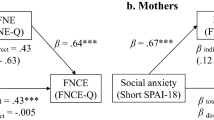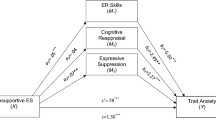Abstract
There are many studies showing that social anxiety disorder is associated with negative parental attitudes. It is known that exposure to negative parental attitudes and related negative experiences during childhood affect the cognitive process and cause the development of cognitive distortions. The aim of this study was to evaluate the relationship between perceived parental acceptance-rejection and control levels and social anxiety levels in adolescents, and the mediating role of interpersonal cognitive distortions in the relationship between both variables. The sample of the study consists of 142 adolescents with a mean age of 15.9 ± 1.36 years. Participants were evaluated with the “Social Anxiety Scale for Children-Revised Form”, “Child Versions the Parental Acceptance-Rejection/Control Questionnaire for Mothers and Fathers” and “Interpersonal Cognitive Distortions Scale”. The results showed that perceived levels of parental rejection and maternal control positively predicted adolescents’ social anxiety levels and interpersonal cognitive distortion levels. In the regression model established to evaluate the mediating role of the sub-dimensions of interpersonal cognitive distortions; it was found that “unrealistic relationship expectations” played a partial mediator role between mothers’ rejecting and overly controlling attitudes and adolescents’ social anxiety levels. “Interpersonal rejection”, which is the other sub-dimension of interpersonal cognitive distortions, was found to play a full mediator role between both the rejecting attitudes of mothers and fathers, the controlling attitudes of mothers, and the social anxiety levels of adolescents. The results showed that interpersonal cognitive distortions played a mediating role in the relationship between perceived negative parental attitudes and adolescents’ social anxiety levels. This study is one of the few studies that examines the relationship between parental attitudes and social anxiety levels in the adolescent age group in terms of the mediating effects of cognitive distortions. It is thought that our results are important for understanding the nature of social anxiety disorder and its treatment approach.



Similar content being viewed by others
Data availability
The datasets generated during and/or analysed during the current study are available from the corresponding author on reasonable request.
References
Akbay, S. E., & Guduz, B. (2020). The role of self-esteem in adolescents' perception of parents and social anxiety levels. International Journal of Progressive Education, 16(2), 195–204. https://doi.org/10.29329/ijpe.2020.241.13
American Psychiatric Association. (2013). Diagnostic and statistical manual of mental disorders (DSM-5). American Psychiatric Association Publishing.
Bahari, S., Toozandehjani, H., & Taheri, E. (2020). Effectiveness of modular cognitive behavioral therapy on the anxiety sensitivity, cognitive distortions of teen girls who has social anxiety disorder. Journal of Clinical Psychology, 12(2), 51–62. https://doi.org/10.22075/JCP.2020.19017.1760
Baron, R. M., & Kenny, D. A. (1986). The moderator–mediator variable distinction in social psychological research: Conceptual, strategic, and statistical considerations. Journal of Personality and Social Psychology, 51, 1173–1182. https://doi.org/10.1037/0022-3514.51.6.1173
Beck, A. T. (1976). Cognitive therapy and the emotional disorders. International Universities Press.
Beck, A. T., Rush, A. J., Shaw, B. F., & Emery, G. (1987). Cognitive therapy of depression. The Guilford Press.
Chorpita, B. F., & Barlow, D. H. (1998). The development of anxiety: The role of control in the early environment. Psychological Bulletin, 124, 3–21.
Clark, D. M., & Wells, A. (1995). A cognitive model of social phobia. In R. G. Heimberg, M. R. Liebowitz, D. A. Hope, F. R. Schneier, R. G. Heimberg, M. R. Liebowitz, D. A. Hope, & F. R. Schneier (Eds.), Social phobia: Diagnosis, assessment, and treatment (pp. 69–93). Guilford Press.
Demir, T., Eralp-Demir, D., Turksoy, N., Ozmen, E., & Uysal, O. (2000). Çocuklar için sosyal anksiyete ölçeğinin geçerlik ve güvenirliği. Dusunen Adam The Journal of Psychiatry and Neurological Sciences, 13(1), 42–48 (Turkish Article).
Dwairy, M., & Menshar, K. E. (2006). Parenting style, individuation, and mental health of Egyptian adolescents. Journal of Adolescence, 29(1), 103–117. https://doi.org/10.1016/j.adolescence.2005.03.002
Ebrahimi, L. S., Mousavi, S. E., Gharraee, B., Bytamar, J. M., & Isfeedvajani, M. S. (2019). Cognitive errors and psychological resilience in patients with social anxiety and obsessive-compulsive disorder: A cross-sectional study. Hospital Practices and Research, 4(1), 25–30. https://doi.org/10.15171/hpr.2019.04
Eksi, H., Baris, S., & Demir, H. (2020). Helicopter parental attitude, ınflated self in adolescents: Mediator effect of emotional autonomy, social anxiety variables. Manisa Celal Bayar University Journal of Social Sciences, 18, 83–100. https://doi.org/10.18026/cbayarsos.627884
Gallagher, B., & Cartwright-Hatton, S. (2008). The relationship between parenting factors and trait anxiety: Mediating role of cognitive errors and metacognition. Journal of Anxiety Disorders, 22, 722–733. https://doi.org/10.1016/j.janxdis.2007.07.006
Giaouzi, A., & Giovazolias, T. (2015). Remembered parental rejection and social anxiety: The mediating role of partner acceptance-rejection. Journal of Child and Family Studies, 24, 3170–3179. https://doi.org/10.1007/s10826-015-0120-z
Gómez-Ortiz, O., Romera, E. M., Jiménez-Castillejo, R., Ortega-Ruiz, R., & García-López, L. J. (2019). Parenting practices and adolescent social anxiety: A direct or indirect relationship. International Journal of Clinical and Health Psychology, 19, 124–133. https://doi.org/10.1016/j.ijchp.2019.04.001
Hamamci, Z., & Buyukozturk, S. (2004). The interpersonal cognitive distortions scale: Development of the scale and investigation of its psychometric characteristics. Psychological Reports, 95, 291–303. https://doi.org/10.2466/pr0.95.1.291-303
Kaplan, D. (2021) The Mediating Role of Self-Compassion, Interpersonal Beliefs and Cognitive Distortions in the Association Between Perceived Parental Attitudes And Social Anxiety. (Master Thesis). Maltepe University, Istanbul.
Knappea, S., Beesdo-Bauma, K., Fehmb, L., Liebc, R., & Wittchen, H. U. (2012). Characterizing the association between parenting and adolescent social phobia. Journal of Anxiety Disorders, 26, 608–616. https://doi.org/10.1016/j.janxdis.2012.02.014
Koyuncu, A., İnce, E., Ertekin, E., & Tükel, R. (2019). Comorbidity in social anxiety disorder: Diagnostic and therapeutic challenges. Drugs Context, 8, 1–13. https://doi.org/10.7573/dic.212573
La Greca, A. M., Dandes, S. K., Wick, P., Shaw, K., & Stone, W. L. (1988). Development of the social anxiety scale for children: Reliability and concurrent validity. Journal of Clinical Child Psychology, 17(1), 84–91. https://doi.org/10.1207/s15374424jccp1701_11
Leathy, R. (2014). Cognitive therapy techniques: A practitioner’s guide. The Guilford Press.
Liebowitz, M. R. (1987). Social phobia. Modern Problems of Pharmacopsychiatry, 22, 141–173. https://doi.org/10.1159/000414022
Mącik, D. (2021). Temperament, parenting styles and the intensity of early maladaptive schemas: Assessment of correlations in a non-clinical adult group. Behavioural and Cognitive Psychotherapy, 49(2), 218–232. https://doi.org/10.1017/S1352465820000831
Mert, A. (2022). Parent attitudes and submissive behaviors in adolescents as social anxiety predictors. Educational Research and Reviews, 17(2), 46–52. https://doi.org/10.5897/ERR2021.4196
Mousavi, S. E., Low, W. Y., & Hashim, A. H. (2016). Perceived parenting styles and cultural ınfluences in adolescent’s anxiety: A cross-cultural comparison. Journal of Child and Family Studies, 25, 2102–2110. https://doi.org/10.1007/s10826-016-0393-x
Noyan, H., & Berk Sertel, H. O. (2007). Social phobia, intraversion / extraversion and school achievement in adolescents. Psychological Studies, 27, 31–50.
Possel, P., & Thomas, S. D. (2011). Cognitive triad as mediator in the hopelessness model? A three-wave longitudinal study. Journal of Clinical Psychology, 67, 224–240. https://doi.org/10.1002/jclp.20751
Preacher, K. J., & Hayes, A. F. (2008). Asymptotic and resampling strategies for assessing and comparing ındirect effects in multiple mediator models. Behavior Research Methods, 40, 879–891. https://doi.org/10.3758/BRM.40.3.879
Rapee, R. M., & Spence, S. H. (2004). The etiology of social phobia: Empirical evidence and an initial model. Clinical Psychology Review, 24, 737–767. https://doi.org/10.1016/j.cpr.2004.06.004
Rohner, R. P. (1986). The warmth dimension: Foundations of parental acceptance rejection theory. Sage Publications.
Rohner, R. P., & Khaleque, A. (2005). Handbook for the study of parental acceptance and rejection, Storrs. Rohner Research Publications.
Rohner, R. P., & Veneziano, R. A. (2001). The importance of father love: History and contemporary evidence. Review of General Psychology, 5(4), 382–405.
Rohner, R. P., Saavedra, J., & Granum, E. O. (1978). Development and validation of the parental acceptance rejection questionnaire: Test manual. JSAS: Catalogue of Selected Documents in Psychology, 8, 7–8.
Saritas Atalar, D., & Gencoz, T. (2015). The mediating role of early maladaptive schemas in the relationship between maternal rejection and psychological problems. Turkish Journal of Psychiatry, 26(1), 40–47.
Schneier, F., & Goldmark, J. (2015). Social anxiety disorder. Anxiety Disorders and Gender, 3, 49–67. https://doi.org/10.1007/978-3-319-13060-6_3
Spokas, M., & Heimberg, R. G. (2009). Overprotective parenting, social anxiety, and external locus of control: Cross-sectional and longitudinal relationships. Cognitive Therapy and Research, 33, 543–551. https://doi.org/10.1007/s10608-008-9227-5
Tezcan, G., Erden, G., & Yigit, I. (2017). Parental acceptance-rejection in the development of social anxiety in the childhood: The mediating role of automatic thoughts. Journal of Clinical Psychology Research, 1(1), 12–23. https://doi.org/10.7816/kpd-01-01-02
Turkcapar, M. H. (1999). Psychological theory of social phobia. Turkish Journal of Clinical Psychiatry, 2, 247–253.
Turkcapar, H. (2014). Bilişsel Terapi. Hekimler Yayın Birliği Yayıncılık.
Tutuncu, S. (2020). Review: The effects of family of origin attitudes on psychopathology. Journal of Development and Psychology, 1(1), 49–56.
Varan, A. (2003). Türk örnekleminde EKRÖ ve KİDÖ çocuk ve ebeveyn ölçeklerinin geçerlik ve güvenirlik çalışmaları. Retrieved from http://www.azmivaran.com/arastirma/ekar-kurami-arastirmalari. (Turkish Article).
Vasey, M., & Dadds. (2001). The developmental psychopathology of anxiety. University Press.
Vatansever Bulut, C., Uguz, S., Kutlu, M. O., & Akman, P. (2020). Correlation between cognitive distortions and social phobia symptom levels of students in first adolescence period. The Journal of Turkish Educational Sciences, 18, 1009–1024. https://doi.org/10.37217/tebd.826307
Veneziano, R. A. (2000). Perceived paternal and maternal acceptance and rural African American and European American youths' psychological adjustment. Journal of Marriage and Family, 62(1), 123–132.
Vogel, F., Reichert, J., Hartmann, D., & Schwenck, C. (2023). Cognitive variables in social anxiety disorder in children and adolescents: A network analysis. Child Psychiatry & Human Development, 54, 625–638. https://doi.org/10.1007/s10578-021-01273-9
Weems, C. F., Berman, S. L., Silverman, W. K., & Saavedra, L. M. (2001). Cognitive errors in youth with anxiety disorders: The linkages between negative cognitive errors and anxious symptoms. Cognitive Therapy and Research, 25, 559–575. https://doi.org/10.1023/A:1005505531527
Young, J. E., Klosko, J. S., & Weishaar, M. E. (2003). Schema therapy: A practitioner’s guide. The Guilford Press.
Funding
This research received no specific grant from any funding agency in the public, commercial or non-profit sectors.
Author information
Authors and Affiliations
Contributions
Sireli O and Colak M conceptualised and designed the study, collected the data. Sireli O wrote the article. Colak M supervised the study and helped in the writing of the article. All authors have read and approved the final manuscript.
Corresponding author
Ethics declarations
Ethical approval
The ethics committee approval of the study was received by Mugla Sitki Kocman University Health Sciences Ethics Committee on 23.01.2021.
Informed consent
Informed consent was obtained from all individual participants included in the study, their parents, and legal guardians.
Competing interests
The authors have no competing interests to declare that are relevant to the content of this article.
Additional information
Publisher’s Note
Springer Nature remains neutral with regard to jurisdictional claims in published maps and institutional affiliations.
Rights and permissions
Springer Nature or its licensor (e.g. a society or other partner) holds exclusive rights to this article under a publishing agreement with the author(s) or other rightsholder(s); author self-archiving of the accepted manuscript version of this article is solely governed by the terms of such publishing agreement and applicable law.
About this article
Cite this article
Sireli, O., Colak, M. The relationship between adolescents’ social anxiety level and parental acceptance-rejection and control: the mediating role of ınterpersonal cognitive distortions. Curr Psychol 43, 15202–15212 (2024). https://doi.org/10.1007/s12144-023-05488-y
Accepted:
Published:
Issue Date:
DOI: https://doi.org/10.1007/s12144-023-05488-y




